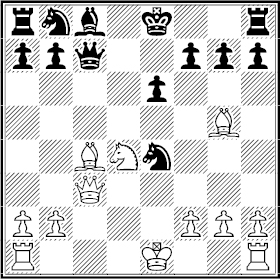
Chess is transparent: Your opponent can see the same pieces as you. The one who sees farther almost always shas an advantage.
Yuri Averbakh White
Yakov Estrin Black
Moscow 1964
Queen’s Gambit Declined D39
1 c4 ♘f6 2 ♘c3 e6 3 ♘f3 d5 4 d4 ♗b4 5 ♗g5 dxc4 6 e4 c5 7 ♗xc4 cxd4 8 ♘xd4 ♕c7 9 ♕b3!
The threats were 9...♕xc4 and 9...♘xe4. To choose 9 ♕b3 over 9 ♕e2 White had to foresee:
9...♗xc3+ 10 ♕xc3! ♘xe4

Now 11 ♗b5+ ♘c6 and 12 ♗xc6+ bxc6 looks good in view of 13 ♘b5! (13...♘xc3? 14 ♘xc7+ or 13...♕b6 14 ♕xg7!).
But Black had foreseen a desperado – 12...♕xc6!, e.g. 13 ♘xc6 ♘xc3 14 bxc3 bxc6 costs White a pawn. And 14 ♘xa7 ♖xa7 15 bxc3 ♗d7 favors Black. White saw something more.
11 ♘b5!
Again 11...♘xc3 loses to 12 ♘xc7+ and ♘xa8.
11...♕c5 12 ♕xg7 ♖f8 13 ♗h6 ♕xf2+?
If 13...♘d7 White has a great endgame with 14 ♕d4 or an initiative with 14 ♖c1 (14...a6 15 0-0! axb5 16 ♗xe6 or 14...♕xf2+ 15 ♔d1 ♔d8 16 ♖f1).
14 ♔d1 ♘d7
Question 311: What’s best after 15 ♘c7+ ♔e7 ?
15 ♖e1! ♘ef6 16 ♗xe6!
Now 16...fxe6 17 ♖xe6+ allows mate and so does 16...♔d8 17 ♗xd7 ♘xd7? 18 ♗g5+.
16...♕xb2 17 ♖c1! resigns.
Sandor Orgovan White
Hans Sonntag Black
Balatonbereny 1987
1 d4 d5 2 ♘f3 ♘f6 3 c4 dxc4 4 ♘c3 e6 5 e4 ♗b4 6 ♗g5 c5 7 ♗xc4 cxd4 8 ♘xd4 0-0 9 0-0 h6 10 ♗h4 ♗e7? 11 e5! ♘fd7 12 ♗g3 a6 13 ♕g4 ♘c6 14 ♘xc6 bxc6 15 ♖ad1 ♕c7 16 ♖fe1 ♘b6 17 ♗d3 ♘d5 18 ♘e4 ♔h8 19 h4 ♕b6 20 ♘g5! ♗d7? 21 ♘xf7+! ♖xf7 22 ♕g6 ♖f5 23 ♗xf5 exf5 24 ♖xd5 resigns.